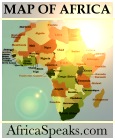Tainted U.S. oil supplies from Africa's Switzerland
Posted: Monday, April 29, 2002By Wole Akande
(YellowTimes.org) – It is hard to imagine a country with a lower public profile than Equatorial Guinea. Even though the tiny African nation was the setting for "Tropical Gangsters," a best-selling book of development, structural adjustment and the problems that sometimes go with it, few people outside West Africa could probably place it on the right continent.
Easily overlooked between Gabon and Cameroon - where it occupies both an island and a sliver of mainland - Equatorial Guinea was relatively prosperous for a few years after gaining independence from Spain in 1968, largely due to a thriving cocoa business. But years of authoritarian rule and mismanagement dragged the country into an economic abyss as deep as the oil fields off its coasts.
"Equatorial Guinea is one of the most backward countries in the world," wrote Robert Klitgaard in his book. But that was ten years ago. Today, according to the latest "Country Analysis Briefs" on Equatorial Guinea, published April 9, 2002 by the U.S. government agency Energy Information Administration (EIA), the small West African dictatorship Equatorial Guinea has become "the fourth largest destination for American investments in sub-Saharan Africa, behind only South Africa, Nigeria, and Angola." Recent offshore oil discoveries, and the prospects for additional finds, now make Equatorial Guinea "one of the leading areas for oil exploration in sub-Saharan Africa."
Contemporary economic developments in Equatorial Guinea have been dominated by rapid growth in the country's oil sector. Real gross domestic product (GDP) growth was estimated at 65.0 percent in 2001, up from the 16.9 percent growth in 2000, and narrowly missing the amazing 71.2 percent GDP growth witnessed in 1997. EIA reports that economic growth is "expected to remain strong with Real GDP growth of 33 percent in 2002 and 12 percent in 2003."
Equatorial Guinea recently has "emerged as an important oil producer in the Gulf of Guinea, one of the world's most prospective hydrocarbon regions," the EIA analysis explains. Oil production from Equatorial Guinea averaged 181,000 barrels per day (bbl/d) in 2001. Equatorial Guinea's oil production had increased more than tenfold since 1996.
The U.S. agency expects that continuing exploration activities and field development "could see production again increase dramatically over the next few years." The Norwegian company Norland Consultants had estimated that an estimated U.S. $3.4 billion would be invested in offshore field development projects in Equatorial Guinea between 2000 and 2004. Production currently comes from three offshore fields, with two located offshore Bioko and the third offshore the mainland enclave of Rio Muni.
Thanks to oil, Equatorial Guinea boasts one of the highest per capita gross domestic products in Africa, although sadly, few of the benefits have yet to be felt in important sectors such as health and social welfare.
Even though the EIA report provides a small summary of the political situation in the country, conveniently the systematic human rights violations are not mentioned. However, in his January 2002 report, presented before the UN Commission on Human rights, Mr. Gustavo Gallón, the Special Representative of the Commission for Equatorial Guinea, stressed that "the human rights situation in Equatorial Guinea has been a matter of concern to the Commission on Human Rights for longer than that of any other country."
The Equatorial Guinean opposition opposes the strong increase in foreign investment while the country is governed by Dictator Teodoro Obiang and the oil revenue does not reach the country's citizens. Investing in the country was "marginalizing our people together with the Equatorial Guinean opposition," the opposition party UDI stated. "Not one dollar arriving from the oil and gas exploitation and commercialization figures in neither the national budget or in the accounts of any other public agency," a party spokesman said.
Since the oil boom that started in 1997, Equatorial Guinea has not only been a target of pressure to improve its disastrous human rights situation, it has also been able to spend its new riches on pressuring other countries not to intervene in its affairs. Now an "African Switzerland," repression of the political opposition is stronger than ever but outside pressure remarkably low.
According to Amnesty International, "the need for ongoing international monitoring has dramatically increased since March 2002 when more than one hundred people, both civilians and military and security personnel, were arrested and are still held in detention, for alleged links with the Fuerza Democrática Republicana (FDR), Republican Democratic Force, an unofficial opposition party."
A wave of arrests - officially because a military coup was planned, allegedly in preparation of the upcoming presidential elections - has claimed its first victims; Guillermo Nguema Elá, a former Minister of Finance and opposition leader, reportedly died by the injuries he sustained during torture in detention. Relatives of FDR leader Felipe Ondó Obiang, former President of the Equatorial Guinean parliament, also fear he has succumbed to torture in a Bata prison. Three of the latter's sons and a pregnant woman are also detained for their family relations to opposition politicians.
Amnesty also deplored "the fact that the families are being denied access to their relatives and that nobody knows where they are currently being held." The group received "reliable information from eyewitnesses" who saw some of these detainees in prison with visible marks of torture during their first days of detention. Accordingly, the human rights organization agrees with the opposition's allegations that "torture by security forces is routine in Equatorial Guinea."
Unfortunately, such humanitarian issues in oil producing African countries like Equatorial Guinea do not concern American government officials. Oil is one of the main reasons why the U.S. policy makers are focusing on the African continent. In fact, it is the most valuable export encouraged by Washington from the continent. On February 11, 2002, the Kenyan Weekly newspaper, The East African, summed up this interest by reporting: "Speaking recently at a Washington forum on African oil's increasing importance to the U.S., Assistant Secretary of State for African Affairs Walter Kansteiner declared, "It is undeniable that this has become of national strategic interest to us." Added Congressman Edward Royce, chair of the House of Representatives subcommittee on Africa: "African oil should be treated as a priority for U.S. security post-September 11."
The paper adds: "American military and economic policy regarding Africa may thus focus more closely in coming years on those few sub-Saharan nations that export significant amounts of oil to the U.S. Non-oil producing countries such as Kenya, Tanzania and Uganda could consequently receive less attention from the architects of Washington's Africa policy.
"U.S. officials taking part in a January 25 forum argued that sub-Saharan oil-exporting countries are less likely than their Arab counterparts to use oil as a weapon to wrest concessions from the U.S. Political discord or dispute in African oil states is unlikely to take on a regional or ideological tone that would result in a joint embargo by suppliers at once, said Robert Murphy, an economist in the State Department's Office of African Analysis."
Congressman Royce stated in simpler terms that it is very, very difficult to imagine a Saddam Hussein in Africa. The congressman's remarks were reported in South Africa's Business Day newspaper.
Accordingly, with no end in sight to the volatility in the Middle East, it is more likely than ever that African oil producing dictators such as Equatorial Guinea’s Obiang will continue to be the darling of the U.S. government and powerful American corporate interests despite his unsavory record of frightening human rights violations. Despite Washington’s rhetoric of freedom and liberty, once again human rights are sacrificed for the sake of treasured commercial interests.Printer friendly version
Send page by E-Mail

Previous Page | Zimbabwe Watch | Historical Views | Home
NOTICE: All articles are the copyright property of the writers. In accordance with Title 17 U.S.C., section 107, some material on this site is provided without permission from the copyright owner, only for purposes of criticism, comment, scholarship and research under the "fair use" provisions of federal copyright laws. Visit: http://www.law.cornell.edu/uscode/17/107.shtml for more details. If you wish to use copyrighted material from this site for purposes of your own that go beyond 'fair use', you must obtain permission from the copyright owner.










